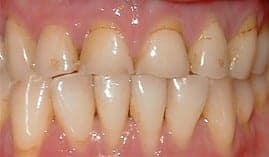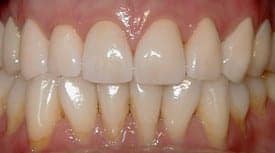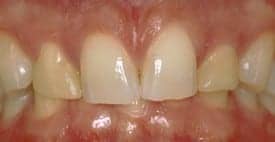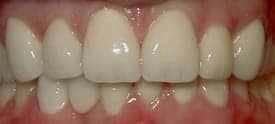Boston Porcelain Veneers
Porcelain Veneers
A tooth crown (or veneer) is a covering that encases the entire tooth surface, restoring a tooth to its original shape and size. A crown protects and strengthens tooth structure that cannot be restored with fillings or other types of restorations.
Although there are several types of crowns, porcelain crowns are the most popular, because they resemble your natural teeth. They are highly durable and will last many years, but like most dental restorations, they may eventually need to be replaced. Porcelain crowns are made to match the shape, size, and color or your teeth giving you a natural and long-lasting beautiful smile.
Reasons for getting crowns:
- Broken or fractured teeth
- Cosmetic enhancement
- Decayed teeth
- Fractured fillings
- Large fillings
- Root canals

What does getting a crown involve?
A crown procedure usually requires two appointments at Boston Center for Oral Health. Your first appointment will involve one of our Boston cosmetic dentists taking several molds that will be used to create your custom crown. A mold will also be used to create a temporary crown which will stay on your tooth for approximately two weeks until your new crown is fabricated by a dental laboratory.
While the tooth is numb, the dentist will prepare the tooth by removing any decay and shaping the surface to properly fit the crown. Once these details are accomplished, your temporary crown will be placed with temporary cement and your bite will be checked to ensure you are biting properly.
At your second appointment, your temporary crown will be removed, the tooth will be cleaned, and your new crown will be carefully placed to ensure the spacing and bite are accurate.
Regular dental visits are encouraged once your new crown is placed in order to check for any changes that may happen over time.
Smile Gallery
Before

Before: Patient needs upper arch rehabilitation. Presents with upper anterior teeth that are stained, tooth edges are worn down and chipped, and gum line recession is present.
After

After: Patient’s smile is restored with the placement of 8 upper porcelain crowns (caps). Gumline and tooth edges are now uniform. Patient has longer, better-shaped teeth to enhance the smile line and aid in chewing/biting function.
Before

Before: Patient is unhappy with six upper anterior teeth. The edges are uneven, the gum line is uneven on the two central incisors, and the color/shade is not uniform. The two lateral incisor teeth have been previously restored and are poorly shaped.
After

After: Patient’s smile is restored with 6 upper anterior porcelain crowns that are properly shaped, gum line is uniform, and color/shade is the same for all 6 incisor teeth.
Note: Patients depicted in photos have provided their consent to display their pictures online. Each patient is unique, and results may vary.
Dental Veneers: Transform Your Smile with Expert Care from BCOH
Are you interested in brightening your smile and enhancing the look of your teeth? Dental veneers could be the ideal answer for you, especially if you want to enhance the appearance of your teeth. At the Boston Center for Oral Health (BCOH), we specialize in providing expert care and guidance through the process of getting dental veneers. This article delves into what dental veneers are, the benefits they offer, the process involved in getting them, their maintenance, associated costs, and how to choose the right dentist for this transformative procedure.
What are Dental Veneers and How Do They Enhance Your Smile?
Understanding the Advantages of Dental Porcelain Veneers
Dental veneers are a form of cosmetic dentistry. extremely thin layers crafted from porcelain or composite substances that are specifically tailored to encase the front surfaces of your natural teeth. They serve as a remarkable solution for addressing various dental issues, including discoloration, chips, cracks, and gaps. The benefits of dental porcelain veneers are numerous; they not only provide a natural appearance but also enhance your smile by creating a uniform, beautiful look. Porcelain veneers are highly resistant to stains, allowing you to maintain a bright and attractive smile over time. Additionally, they are durable and can last for many years, making them a worthwhile investment in your oral health and aesthetics.
Types of Dental Veneers Available
When considering dental veneers, it is essential to understand the different types available and the cost of a dental crown. The two most common types are porcelain veneers and composite veneers. Porcelain veneers are a popular choice due to their strength and ability to mimic the natural translucence of teeth. They are crafted in a dental lab and require a bit of tooth preparation. On the other hand, composite veneers are made from a tooth-colored resin applied directly to the teeth, which allows for quicker application and minimal preparation. Additionally, no-prep veneers are available, which require little to no alteration of your natural teeth, making them a less invasive option for enhancing your smile.
How Dental Veneers Improve the Appearance of Your Smile
Dental veneers can significantly improve the appearance of your smile by correcting various cosmetic concerns. If you have teeth that are discolored due to decay or staining, veneers can effectively cover these imperfections, providing a bright, white smile. They can also conceal chips and cracks, helping to restore your teeth to their original beauty. Furthermore, dental veneers can close gaps between your teeth and create a more uniform look, enhancing your overall facial aesthetics. By choosing dental veneers, you can achieve a beautiful smile that boosts your confidence and complements your personality.
What are the costs associated with Dental Veneers?
Cost of Dental Veneers Compared to Other Dental Enhancements
The cost of dental veneers can vary widely based on the materials used and the complexity of the case. Typically, the cost of porcelain veneers can vary between $800 and $2,500 for each tooth.While this might seem high, it is essential to consider the value they provide in enhancing your smile and boosting your confidence. Compared to other dental enhancements, such as dental crowns or implants, veneers may be more cost-effective for purely cosmetic purposes. Dental implants, for example, can be significantly more expensive due to the surgical nature of the procedure.
Frequently Asked Questions
What are the benefits of getting a dental crown?
A dental crown is a restoration that covers the entire tooth surface, restoring it to its original shape and size. Crowns are necessary when the tooth structure is damaged beyond what a filling can repair.
The benefits of getting a dental crown include:
-Improved appearance: Crowns can be made to match the color of your natural teeth, so they blend in seamlessly.
-Protection: Crowns strengthen the tooth and prevent further damage.
-Durability: With proper care, crowns can last for many years.
If you are considering getting a dental crown, talk to our Doctors about what option would be best for you.
Are Crown Durable?
Crowns are often more durable than other dental restorations, which means they can last longer and resist wear and tear. Crowns are also less likely to chip or break than other types of dental restorations. However, crowns are not indestructible, and they may need to be replaced eventually. The average lifespan of a crown is 5 to 15 years, but this will vary depending on the individual.
What are the different types of dental crowns?
There are three main types of dental crowns: all-ceramic, all-metal, and metal-ceramic.
1- All-ceramic crowns are made entirely out of ceramic materials and are often used for the front teeth since they can be matched to the natural color of the teeth.
2- All-metal crowns are made out of gold or other metals and are best suited for back teeth since they are more durable.
3- Metal-ceramic crowns are a combination of both metal and ceramic materials and offer a more natural look than all-metal crowns.
How much does it cost to get a dental crown?
The cost of a dental crown depends on the material used, the size of the crown, and the location of the tooth.
The most common type of dental crown is made from porcelain. Porcelain crowns are strong and durable, and they can be matched to the color of your natural teeth. The cost of a porcelain crown ranges from $500 to $1,500.
Gold crowns are also an option for restoring a damaged tooth. Gold crowns are less expensive than porcelain crowns, but they are not as realistic looking. The cost of a gold crown ranges from $600 to $2,500.
When should I get a Dental Crown?
Dental crowns are used to protect a tooth from further damage, restore a tooth that has already been damaged, or improve the appearance of a tooth. Your dentist may recommend a dental crown if you have a tooth that is:
-Severely decayed
-Cracked or fractured
-Worn down
-Misshapen or severely discolored
-Tooth that has had root canal treatment
The procedure for getting a dental crown usually takes place over two visits to the dentist. During the first visit, the dentist will prepare the tooth by removing any decay and shaping the surface of the tooth.
